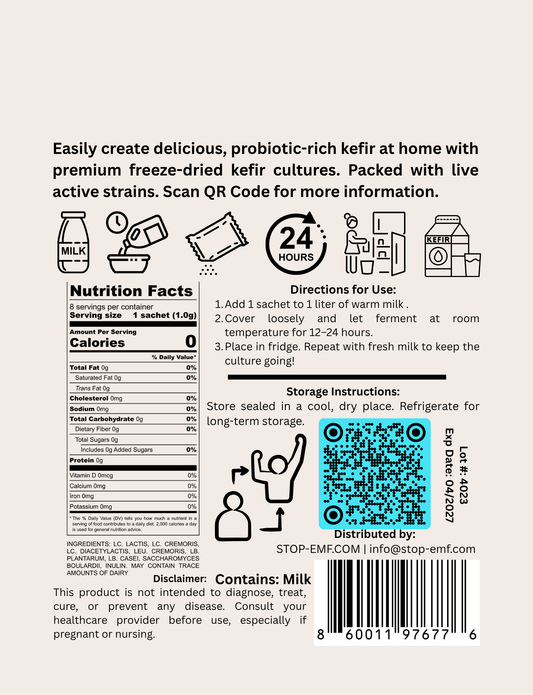As an athlete, you're always looking for ways to optimize your performance and recovery. From fine-tuning your training regimen to experimenting with the latest sports nutrition trends, you're dedicated to pushing your limits and achieving your goals. But have you considered the power of kefir in your athletic journey?
Kefir, a fermented dairy drink, has been gaining popularity among health-conscious individuals, and for good reason. This probiotic-rich beverage offers a wealth of benefits that can be particularly advantageous for athletes. In this blog post, we'll explore how incorporating kefir into your routine can help boost your performance, aid in recovery, and support your overall well-being.
The Nutritional Profile of Kefir
Kefir is a unique fermented dairy product that is packed with essential nutrients and beneficial bacteria. Unlike traditional yogurt, kefir is made by fermenting milk with kefir grains, a symbiotic culture of bacteria and yeast. This process results in a tangy, slightly effervescent drink that is rich in probiotics, vitamins, and minerals.
One of the standout features of kefir is its impressive nutritional profile. A single serving of kefir (around 8 ounces) contains:
- Protein: Kefir is an excellent source of high-quality protein, providing around 10 grams per serving. This protein can help support muscle growth and repair, which is crucial for athletes.
- Calcium: Kefir is a rich source of calcium, with approximately 300 mg per serving. Calcium is essential for maintaining strong bones and preventing stress fractures, a common concern for athletes.
- Vitamin B12: Kefir is an excellent source of vitamin B12, which is important for energy production, red blood cell formation, and nerve function.
- Probiotics: Kefir contains a diverse array of beneficial bacteria, including Lactobacillus and Bifidobacterium strains. These probiotics can help support a healthy gut microbiome, which is crucial for overall health and athletic performance.
Kefir and Athletic Performance
The unique nutritional profile of kefir makes it a valuable addition to an athlete's diet. Here's how kefir can help boost your athletic performance:
Improved Gut Health
The probiotics in kefir can help maintain a healthy gut microbiome, which is essential for optimal nutrient absorption and immune function. A well-balanced gut can improve digestion, reduce inflammation, and even enhance the body's ability to utilize energy from the foods you consume.
Enhanced Hydration
Kefir is a hydrating beverage that can help replenish fluids and electrolytes lost during intense exercise. The electrolytes in kefir, such as potassium and magnesium, can help prevent muscle cramps and support proper muscle function.
Increased Energy and Endurance
The B vitamins and protein in kefir can contribute to improved energy production and utilization, allowing you to train harder and longer. Additionally, the probiotics in kefir may help optimize the body's ability to convert food into usable energy.
Reduced Muscle Fatigue
The anti-inflammatory properties of kefir can help reduce muscle soreness and fatigue, allowing you to recover more quickly between training sessions and competitions.
Improved Immune Function
The probiotics in kefir can help strengthen the immune system, which is crucial for athletes who often face increased stress and risk of illness due to their intense training regimens.
Kefir and Athletic Recovery
In addition to its performance-enhancing benefits, kefir can also play a significant role in your post-workout recovery. Here's how kefir can support your recovery process:
Muscle Repair and Growth
The high-quality protein in kefir can help repair and rebuild muscle tissue that has been damaged during intense exercise. This can lead to faster recovery and improved muscle growth over time.
Reduced Inflammation
The anti-inflammatory properties of kefir can help alleviate muscle soreness and joint pain, allowing you to bounce back more quickly from your workouts.
Improved Sleep Quality
Kefir contains tryptophan, an amino acid that can help promote better sleep. Quality sleep is essential for muscle recovery and overall athletic performance.
Enhanced Hydration and Electrolyte Balance
The electrolytes and fluids in kefir can help replenish what's been lost during exercise, supporting proper hydration and muscle function.
Incorporating Kefir into Your Routine
Incorporating kefir into your athletic routine is relatively straightforward. Here are some tips to help you get started:
- Drink kefir as a post-workout recovery beverage. The protein, probiotics, and electrolytes can help replenish and restore your body.
- Use kefir as a base for smoothies, adding in your favorite fruits, vegetables, and other nutrient-dense ingredients.
- Incorporate kefir into your baking, using it as a replacement for milk or yogurt in recipes like pancakes, muffins, or protein bars.
- Enjoy kefir as a refreshing, probiotic-rich snack throughout the day, either on its own or with a sprinkle of granola or fresh fruit.
Remember, as with any new addition to your diet, it's important to start slowly and listen to your body's response. Gradually increase your kefir intake to allow your gut to adjust to the influx of probiotics.
Conclusion
Kefir is a versatile and nutrient-dense beverage that can be a valuable addition to an athlete's diet. With its impressive nutritional profile, including high-quality protein, probiotics, and essential vitamins and minerals, kefir can help boost athletic performance, aid in recovery, and support overall health and well-being.
By incorporating kefir into your routine, you can take advantage of its many benefits and take your athletic journey to new heights. So why not give kefir a try and see how it can help you achieve your fitness goals?






